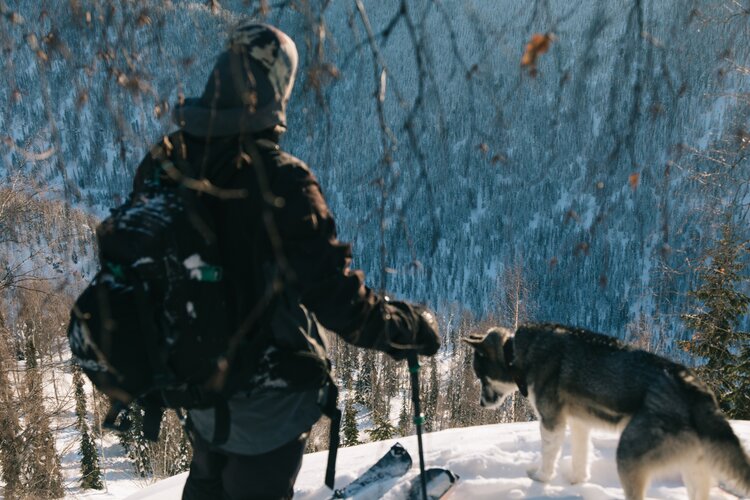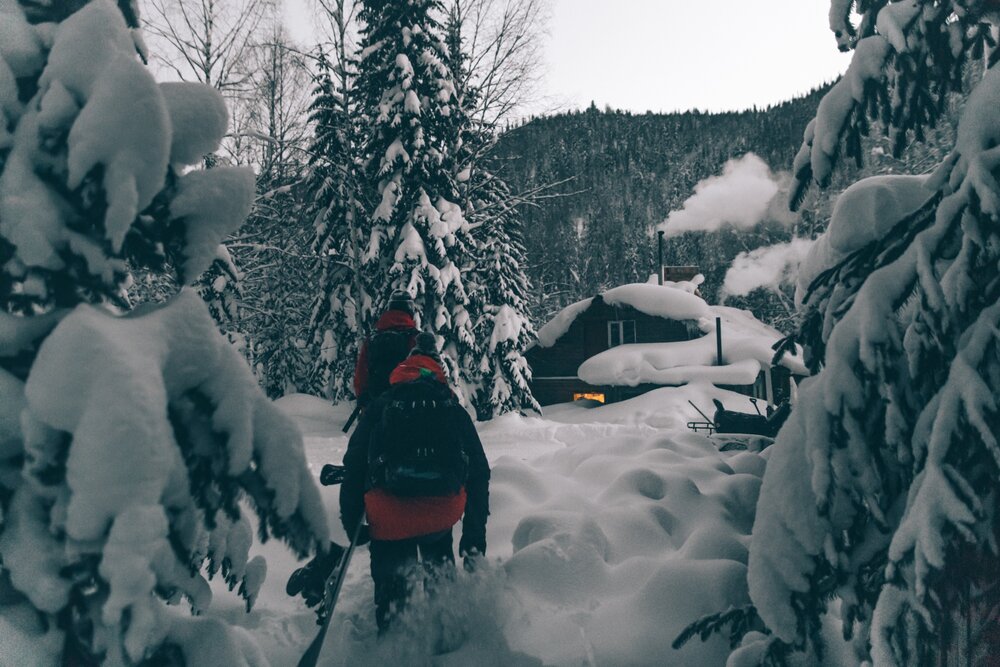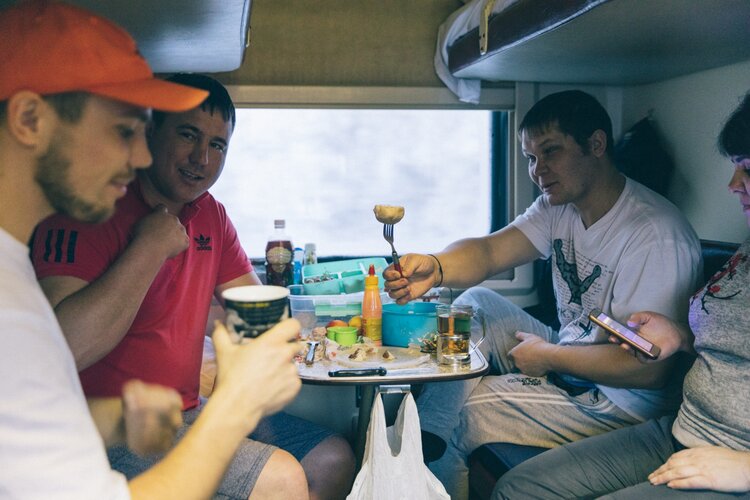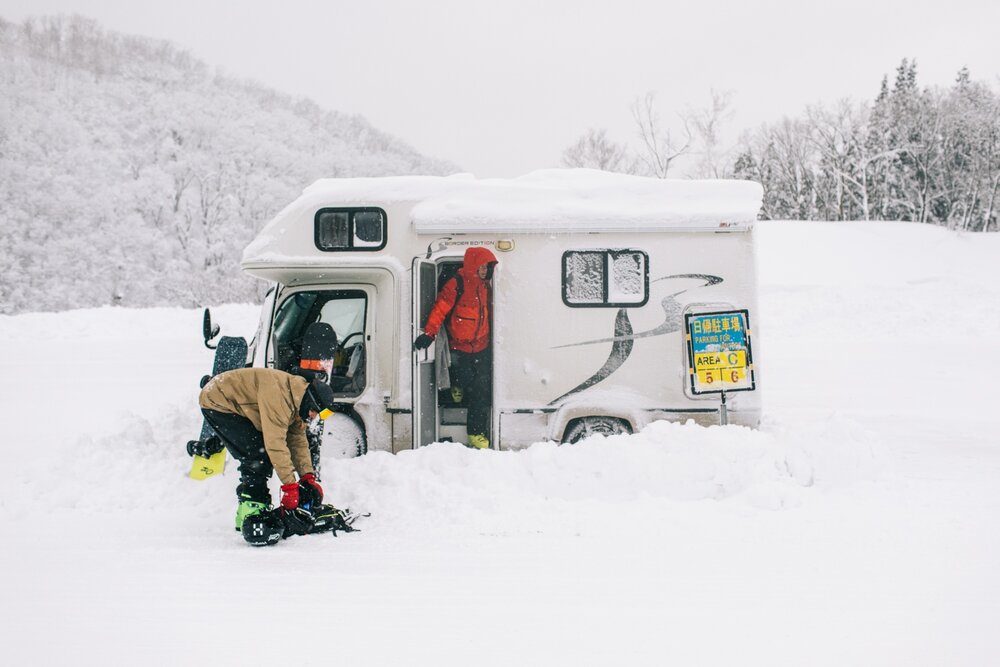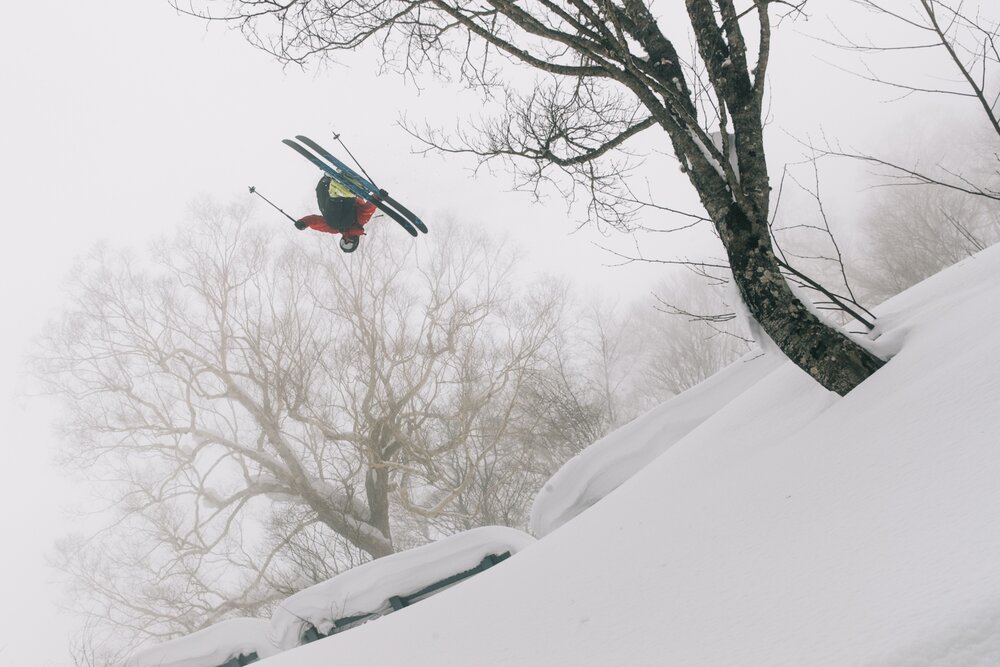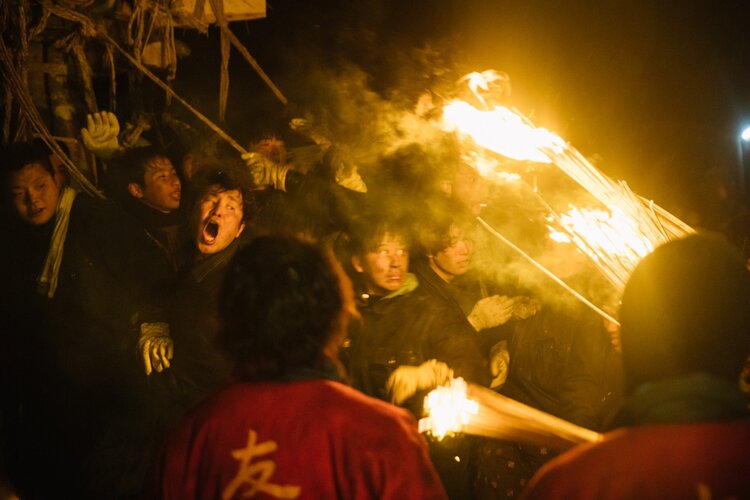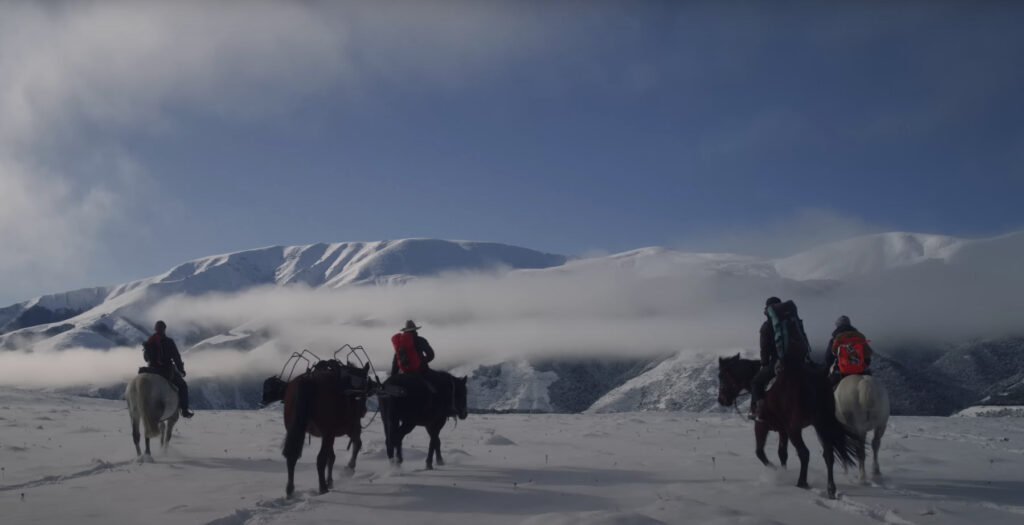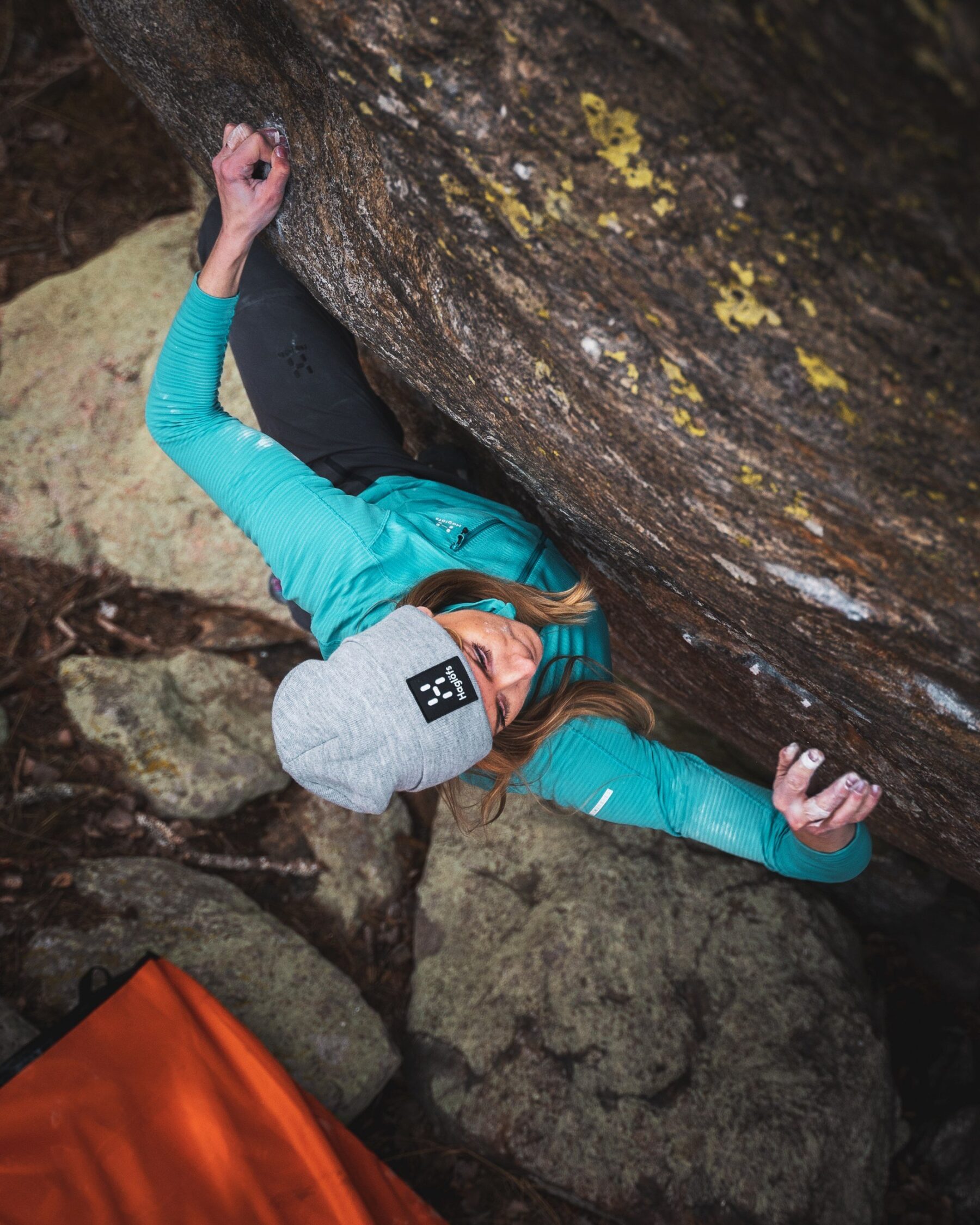Trans-SKI-beria
Story & Photography | Erik Nylander
This is the realisation of a dream. To ride Japanese powder better than we dared ever to fantasise about, but having already discovered something better on route. Tom-Oliver Hedvall and a small crew took the decision to no longer fly seriously. Instead they travelled by train and boat over 12,000km from Stockholm to Japan.
The journey is the destination’ might just sound like a simple cliché, but it was in the deepest forests of Siberia that they found the adventure of a lifetime.
In camouflage braces, stamping his woollen boot on the floor to force his heel inside, Jura rubs his giant bear paws against one another other over the stove. ‘Siberia. Cold,’ he mumbles, and he lunges into the cold to chop more wood.
Outside, the temperature gauge reads -37ºC. After forcing down the overly sweet porridge, a dry slice of bread and some even drier cheese, we step out to start our climb to catch the sunrise. Being outside in this kind of cold feels like a betrayal of the body, but we were up on the mountain yesterday and we know the reward is worth all the betrayal in the world. We have found a powder heaven in a desolate part of Siberia. A region not visited by non-Russians for over 15 years.
This trip was put together by the former professional skier, Tom-Oliver Hedvall and his fearless girlfriend, Sibylla Lundström. As they strive to reduce their carbon footprint to as small as possible, they have completely stopped flying. With their great desire for Japan though, they considered how they could get there without hopping on a flight.
Winding 9289km through Russia between Moscow and Vladivostok, the classic Trans-Siberian railway is the world’s longest railway. With a few hundred miles at sea and connecting trains at either end to reach the sushi holy land, it sounded like a reasonably straight forward plan.
Some months later, when the gang gathers in Stockholm’s Värtahamnen to catch a ferry to Tallinn, the duo has grown to a sextet. Riders William Larsson, Matteus Lestage, Johan Rosén and myself, one knowing less than the second about the third.
On our first of many trains, from Tallinn to Moscow we take votes on if we’ll make it through border control, but soon enough with timid smiles, we make it into the heart of Russia. Like stickers against the windows of our sleeping compartments, we scout the passing countryside whizzing past us as we discuss life’s big questions. With the rails zipping beneath us, the questions remain many and the answers few as we fall deep into slumber.
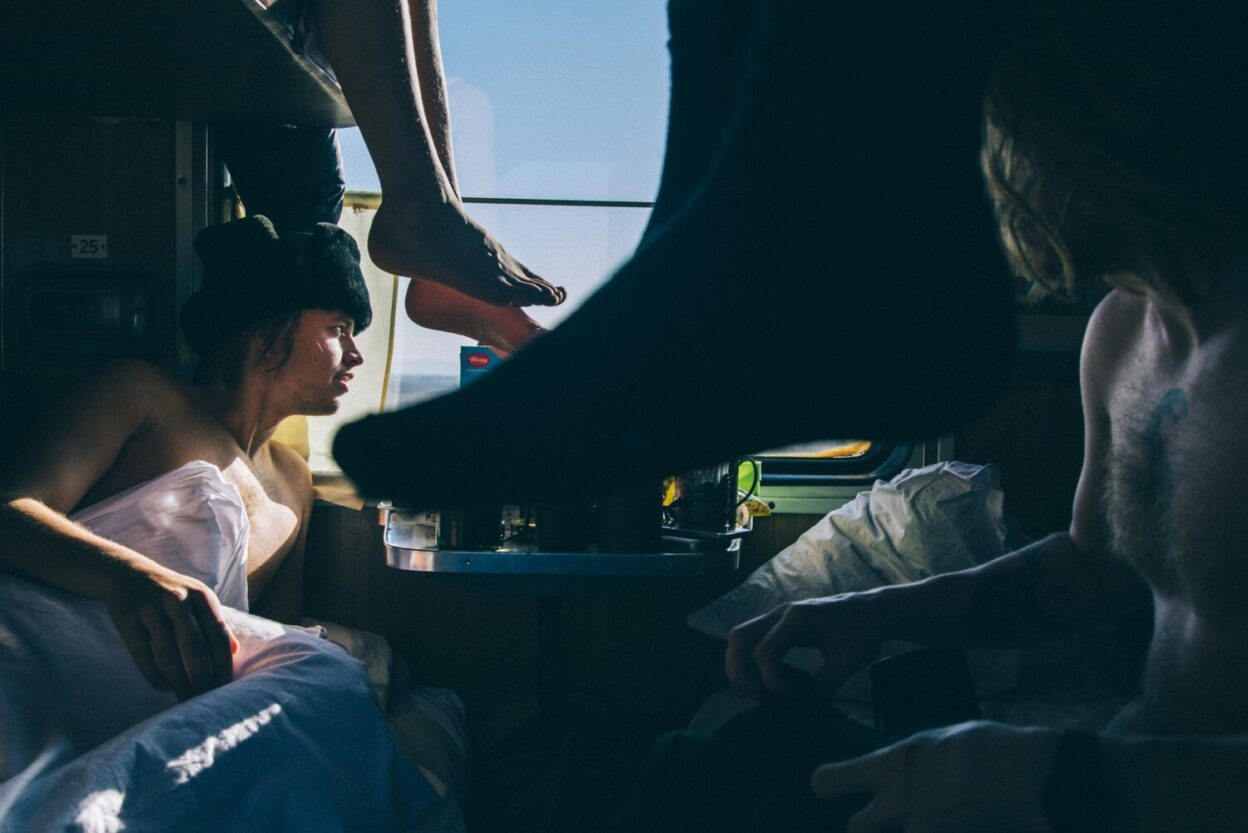
Waiting for us at Moscow train station is Evgeniy Joon Ivanov, the thoroughbred Russian who will convey our language shortcomings when we’re challenged to fight by his intoxicated compatriots. Complete with neck tattoos, he’s a man who’ll make any Swedish gang leader cross to the other side of the street. He’s a professional snowboarder with more Instagram followers than the rest of us combined, and perhaps more importantly with Russia’s best backside air. A few weeks ago Johan wrote to him on Instagram for tips on riding in Russia. His response was that he was keen to join us.
“I see it as a chance to discover my own country with you,” Joon says humbly before kissing his girlfriend goodbye.
Here our first two days of many on the Trans-Siberian Railway begins.
We meet Max, our booked driver, on the platform of our first stop. He plays Euro disco constantly at max volume to stay awake, wearing it into our brains during the ten hours it takes to the ski resort at Sheregesh. It’s so windy, we feel more like storm chasers than skiers.
At four in the morning, we’re met by Kostya San with his girlfriend. Kostya is Russia’s Jeremy Jones, the biggest snowboarding soul we have met and local shredder in Sheregesh. Erik has been in contact with Kostya for a while, sending hundreds of voicemails back and forth across the internet. He has booked some cheap accommodation for us in an apartment complex. It’s eight stories high with no elevator.
Sheregesh is located just below 800 meters on Mount Zelenay. Three days ago, a bear was shot here, inside the resort. The riding is okay but nothing that stands out. We ride lots of forest lines but nothing very steep or big.
“The biggest advantage is that the snow falls early here,” Kostya tells me. “It’s already good in November so many Russian freeriders start the season here.”
It’s Christmas Eve, so we celebrate with our new friends and invite them to try our traditional Swedish Christmas dinner. After sharing many of Kostya’s energetic and infectious laughs, we finally call ourselves best buddies and he shares a plan to show us his secret spot.
“It’s like a fairy tale. A secret place out in the woods, full of pillow lines,” says Kostya enthusiastically. “Nobody knows about it but it’s among the best in all of Russia.” We’re grateful of course for the opportunity to go to his favourite spot but take the hype with a pinch of salt. Either way, it’s another exciting stop on the way to Japan.
“We have 20 seconds to get off. After that they’ll go!” says Kostya and she’s not messing around as we approach another spartan train stop. Our train has taken us deep into the middle of nowhere, with railroad workers and random people jumping straight into the deep snow at a station less stop along the way.
With the efficiency of a Formula 1 tire change, we throw our packs and jump off at the same time as the train howls, ready to roll again. A man with a frosted neoprene mask meets us and takes our packs on his snowmobile trailer while we trudge for an hour through the forest to the cottage where we’ll stay.
Jura, 36, has worked here for 15 years and says that we are the first non-Russians he has met. The domestic tourists come here in the summer to fish and hike but in the winter very few people come by at all.
“I tried skiing once. I fell on every turn on the way down the mountain here behind, after that I have never tried again. It’s not my thing,” he tells one of our crew who understands Russian far better than me.
We are way off in the Siberian wilderness, and we understand that out here, we must solve problems ourselves
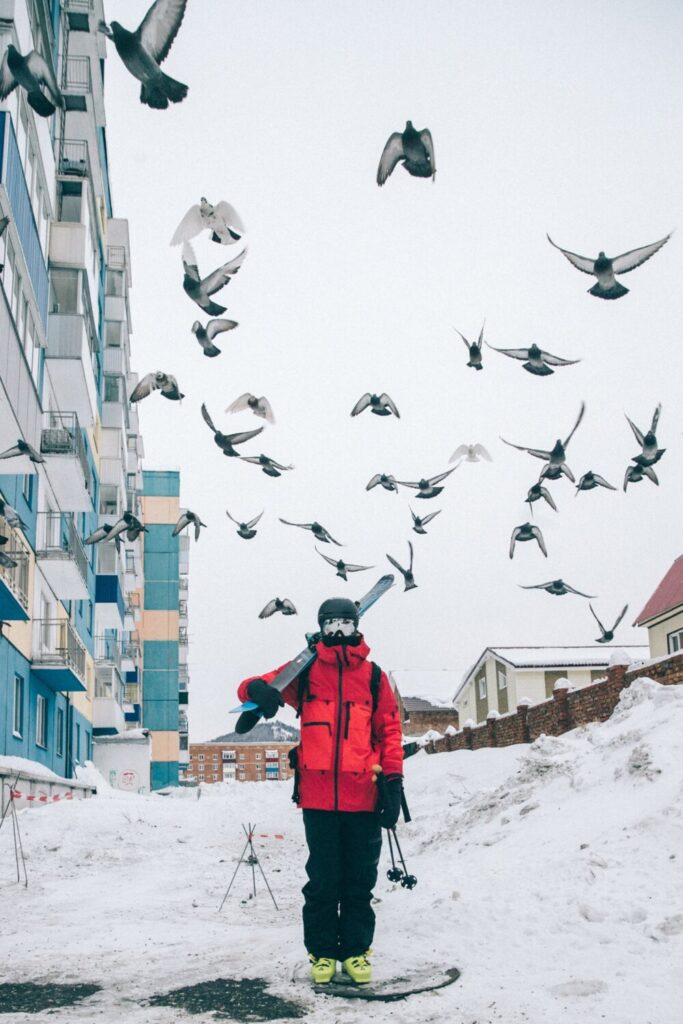
It was a week since the last dump of snow but the only tracks we see are our own
When the evening rolls around and the vodka has loosened his tongue, he wants to talk. There’s big gestures, cheering and good spirit. I’ve no doubt that without any of us really understanding what the other is trying to say, there’s plenty of backstabbing behind smiling faces. I’m 50% sure he’s telling me that he used to be in the military and that he likes to fish and drink vodka in his spare time.
We’re on the mountain from dawn until last light every day, plus a little night skiing with head torches. Kostya knows every stone in the area, methodically we graze on a ridge at a time of steep cushion formations. It was a week since the last dump of snow but the only tracks we see are our own. All parameters of cold, bad food and austere living is now relative against the magic of the riding in this secret little paradise.
We discuss what we’d do if one of us were to get injured. Mobile phone coverage disappeared long before we jumped off the train, and even if we were to get hold of someone via satellite phone, there’s no mountain rescue or helicopter for our sake and the train runs just once a day. We are way off in the Siberian wilderness, and we understand that we solve problems ourselves here. Any line is based on the sureness of your own capability. Even minor injuries can be really dangerous here. In -30ºC you do not survive for long.
“It makes the ride more exciting,” says Tom-Oliver when we discuss our remote position in the 100ºC the sauna down by the river. William lies stretched out on his stomach and grunts while Kostya performs a Russian sauna ritual with spruce twigs whipping hard across his back.
Our last day before moving on, we meet the first other skiers. New Year’s visitors, who had followed our tracks up the mountain. A guy is chalk white in the face, holding his dislodged shoulder. Today’s train has already left and he must be aware of how remote we are out here.
Sadly, we leave Kostya and his hidden gem. But it’s Japan we’re heading for, and the show must go on. The next afternoon he takes the same train as us back to civilisation. Slumped on top of his luggage with his shoulder still dislocated it must have been the worst night of his life. .
We make our reliable Euro disco taxi driver a cash offer he cannot refuse, and he collects and drives us from the train station through New Year’s Eve to the city of Novosibirsk. ‘Happy Fucking New Year!’ we shout out the windows as we mix White Russians in the back seat, pretending we’re content not having planned a more glamorous celebration of Russia’s biggest festival than this.
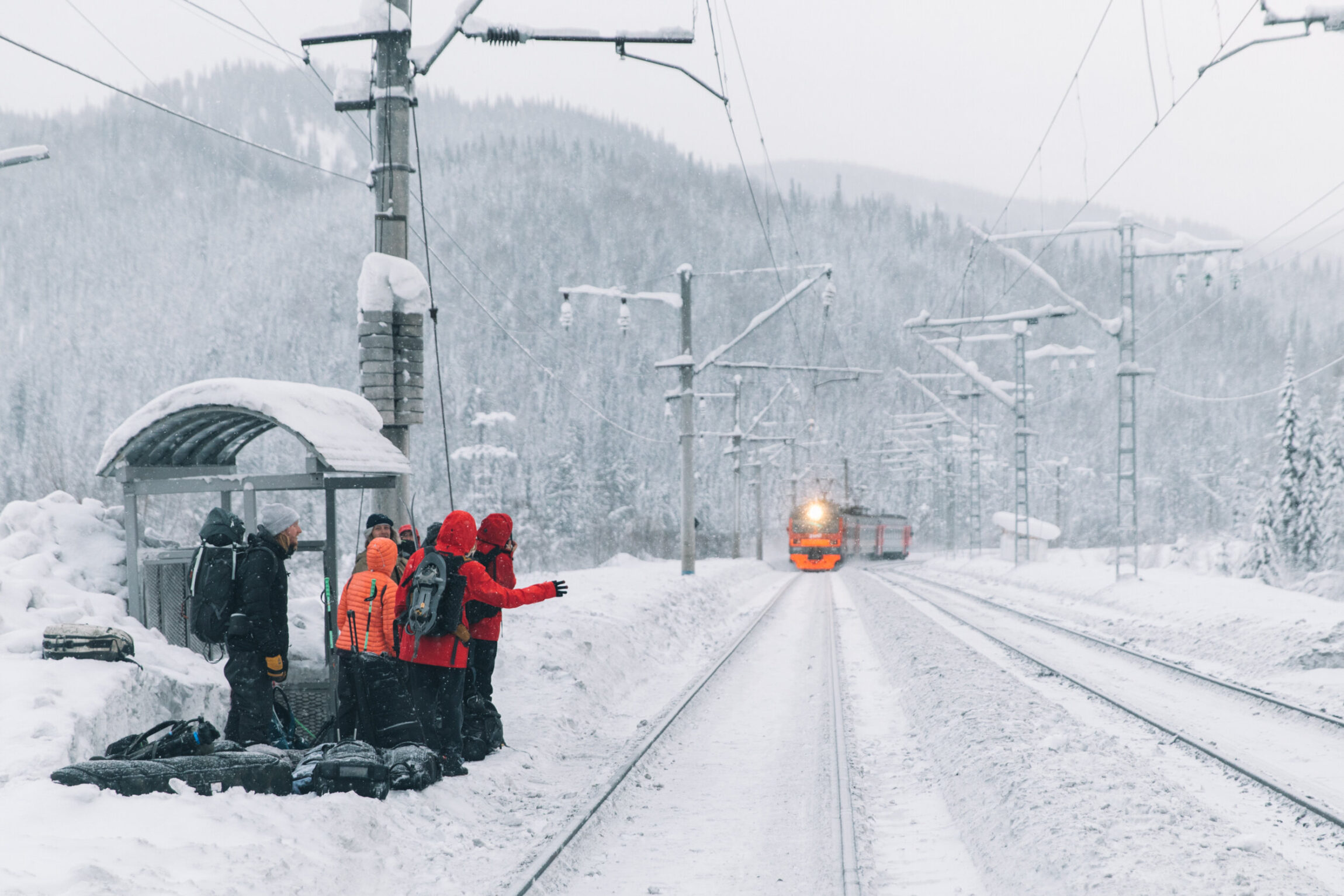
Ahead of us now is four days and five nights by train before we arrive at the port city Vladivostok where we’ll take the ferry to South Korea. We’re all piled up with audiobooks, movies, comics, and diaries to combat this mammoth leg of the journey crack us. But the computers remain in their bags. It becomes surprisingly easy to explore out thoughts and discus the lives of the people who live in the villages, towns and deserted landscapes the other side of the glass. Add to that the fact that our gang of seven didn’t know each other before this trip, plus a few hundred potential extra friends on the train and we’ve solved ours phobias of boredom.
Our carriage is in the middle-class section of the train. A comfortable four-bed compartment, but we quickly all end up further back with 30+people in an open plan of bunk beds. We hang out with two South Korean girls who have been to Lake Baikal, and a family with kids on route to visit a relative invites us for tetra pack potatoes and vodka. A curious but subdued North Korean avoids talking about what his business with Russia but takes pleasure in watching Sibylla tattoo Siberia in Russian letters on Matthew’s forearm. It was misspelled and looked horrendous, but Matthew was happy with it anyway.
“It’s an experiment,” a conductor explains to us with a smile on his face as we realise there’s no food available when the time comes to look for sustenance. Instead we resort to five day old smashed potatoes and instant noodles we find during the train’s short stop. A little later on we’re able to buy smoked fish through the door, as the train stops next to the shores of the majestic Lake Baikal.
Ten time zones later and a few kilos lighter, we meet up with Evginey’s snowboard buddy Vitek in Vladivostok. Russia’s San Francisco is hilly, modern and world famous for its crabs. Eastern Dream is the vessel to take us across the Sea of Japan. A one day journey to the South Korean city of Donghae-si.
On the ferry we settle into a show with school vibes from the ninth grade. The first part of the trip we’re alone in the audience, the second part sees 100 South Korean retirees storm the scene, moving their bodies in a way we didn’t know one could.
When we arrive in Japanese Sakaiminato, three weeks and 12,076km after we left Stockholm, we do it with unreasonably satisfied smiles on our faces. We’ve already had our journey of a lifetime, while one last week by motorhome remains on the Japanese island of Honshu.
We take a Shinkansen (bullet train) to pick up our motorhomes in Tokyo, zipping past Japan’s pristine countryside in triple speed. It’s total silence in comparison with the Russian trains we’d gotten accustomed too. The sun is shining and there is a nurturing hardpack layer of snow under 15 centimetres of fresh powder.
In our new miniature homes on wheels, we skid around The Myoko region. An hour and a half driving east and we end up in Nozawa Onsen, known for its natural hot springs and a picturesque alpine-like village center.
It’s January 15 and we fall right into the annual fire festival held in the village, to promote health, happiness and an abundant harvest for the coming year. The village’s 42-year-olds sit at the top up on a large tower-like wooden formation, at the same time as the village’s 24-year-olds neck sake, bark rhymes in chorus and act like human shields while the remaining villagers go on the attack with burning torches to set fire to the tower. It’s a bizarre inferno of fire, screams, laughter and cheers an hour before the whole tower is on fire.
While Russia and Japan are just a stone ‘s throw from one another over the ocean, the differences between the countries are universes apart. The charming vodka-scented 100-kilo Russians in snowmobile overalls are replaced by superficial 50-kilo Japanese women bowing with their transparent umbrellas. The brutal Russian diet of noodles and vodka we’d developed on the train has now been replaced with the Japanese equivalent; fish-filled rice balls and sugary coffee latte. Military buses have been replaced by something resembling small futuristic toy cars and the snow-laden branches of the spruces replaced by airy larch forest to the horizon.
Over the next few days, the snow falls at a furious pace, and during the last days of the trip in Nozawa Onsen we finally get what we came here for. Blinded by feathery snow, the snow is so thick we struggle to catch breath between turns in the playful forest.
Tom-Oliver and Sibylla’s environmental commitment and refusal to fly has provided us with some of the most unexpected experiences and adventures of our lives. A few days later however, we’re ashamed of our onward journeys by plane. Tom-Oliver and Sibylla on the other hand prepare for an equally long train journey home to Sweden.
Don’t miss a single adventure
Sign up to our free newsletter and get a weekly BASE hit to your inbox
You might also like
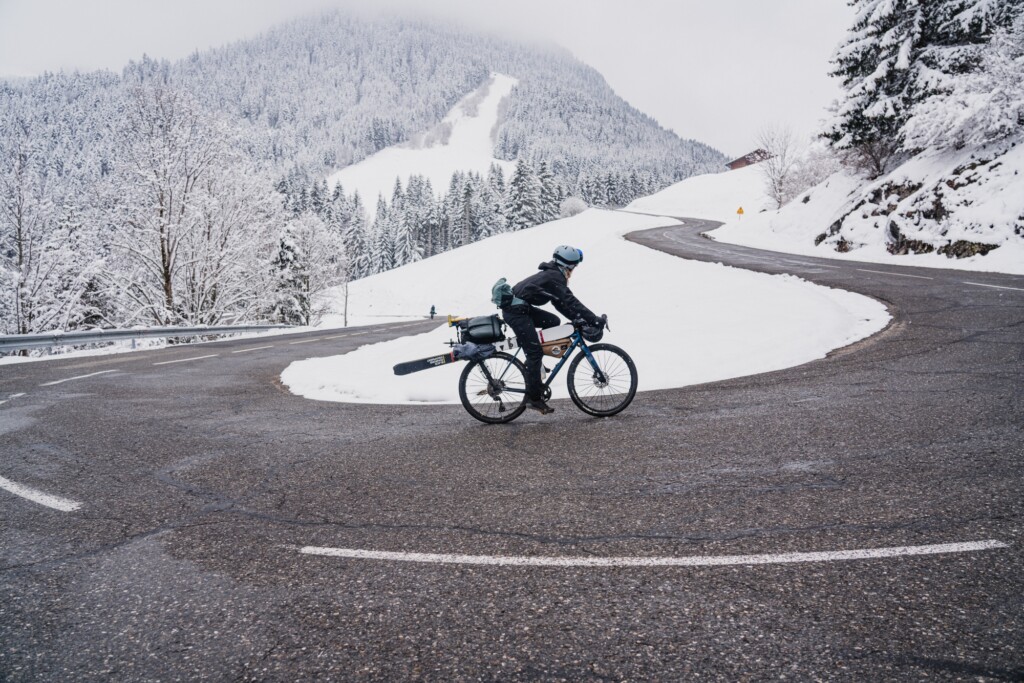
Story • Gaby Thompson • Jun 26, 2023
Bike. SKi. Fondue. Repeat
A backyard adventure with close friends in the French Alps

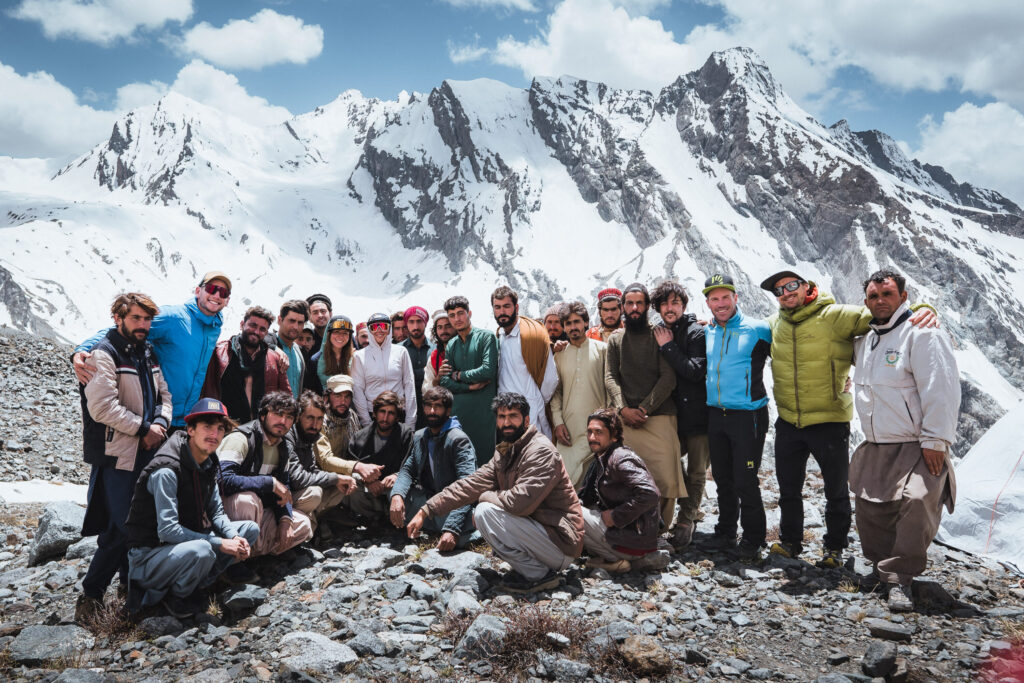
Story • Tom Grant • Feb 23, 2023
Swat Valley Ski School
An impromptu ski lesson during a ski-mountaineering expedition to make the first descent of Falak Sar in northern Pakistan
